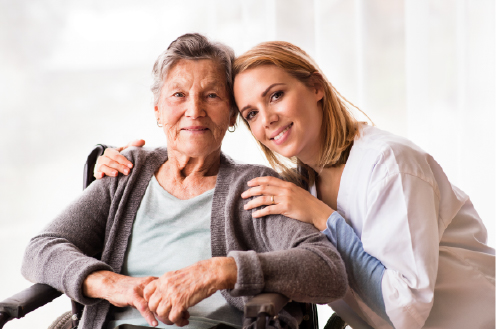Caregiving: A Universal Occupation
Caregiving takes many forms. Many of us help older, sick, or disabled family members and friends every day. We know we are helping, but we don’t think of ourselves as caregivers.

We are glad to do this and feel rewarded by it, but if the demands are heavy, over time we can also become exhausted and stressed. We think we should be able to handle caregiving roles on top of busy work and family schedules and begin to feel guilty and depressed as our stamina wanes.
About 44 million Americans provide 37 billion hours of unpaid, “informal” care each year for adult family members and friends with chronic illnesses or conditions that prevent them from handling daily activities such as bathing, managing medications or preparing meals on their own. Family caregivers, particularly women, provide over 75% of caregiving support in the United States. In 2007, the estimated economic value of family caregivers’ unpaid contributions was at least $375 billion, which is how much it would cost to replace that care with paid services.1
Who Are Caregivers?
The short answer is most of us, at some point in our lives. Caregivers are daughters, wives, husbands, sons, grandchildren, nieces, nephews, partners and friends. While some people receive care from paid caregivers, most rely on unpaid assistance from families, friends and neighbors.
Caregivers manage a wide range of responsibilities. In your family, for example, are you the person who:
- Buys groceries, cooks, cleans house or does laundry for someone who needs special help doing these things?
- Helps a family member get dressed, take a shower and take medicine?
- Helps with transferring someone in and out of bed, helps with physical therapy, injections, feeding tubes or other medical procedures?
- Makes medical appointments and drives to the doctor and drugstore?
- Talks with the doctors, care managers and others to understand what needs to be done?
- Spends time at work handling a crisis or making plans to help a family member who is sick?
- Is the designated “on-call” family member for problems?
In small doses, these jobs are manageable. But having to juggle competing caregiving demands with the demands of your own life on an ongoing basis can be quite a challenge.
With the 65+ age group expected to double to 70 million people by 2030,2 family caregivers increasingly provide care for aging parents, siblings, and friends, most of whom have one or more chronic conditions3 and who wish to remain in their own homes and communities as they age.4 Others belong to the “sandwich generation,” caring for children and parents at the same time.
Caregiving roles and demands are impacted by a number of other factors, including:
- Type of illness: Caring for someone with Alzheimer’s disease, other dementias, or other brain-impairing disorders can be more stressful than caring for someone with a physical impairment. Caring for someone with a cognitive disorder can be a 24/7 job due to the unpredictability of the care recipient’s behavior.5
- Long-distance caregiving: Long-distance caregiving is usually defined as care provided by a caregiver living more than an hour away from the care recipient. Caring from a distance is difficult both emotionally and logistically, and is most common in situations where adult children and their parents do not live in the same area. In these cases, the caregiver’s role is not as much “hands-on” as it is gathering information about available resources, coordinating services and putting together a “team” of family, friends and paid help that can meet the care recipient’s needs.
- Urban versus rural settings: Caregivers living in rural settings face unique challenges. These include fewer available formal services, fewer physicians and health education services, transportation difficulties, weather problems in winter, geographic distance and isolation.6
- Different cultural approaches to caregiving: The United States’ great diversity means that families bring their own histories, traditions and rituals to caregiving. In many cultures, there are family expectations about the caregiving roles of adult children; this is especially true in cultures where daughters or daughters-in-law are expected to assume the primary caregiver role for aging parents.
For some people, caregiving occurs gradually over time. For others, it can happen overnight. Caregivers may be full- or part-time; live with their loved one or provide care from a distance. Caregivers provide a wide range of services, from simple help such as grocery shopping, to complex medical procedures. For the most part, friends, neighbors, and most of all, families, provide–without pay–the vast majority of healthcare in this country.
First Steps: Help for New Caregivers
It is easy to become overwhelmed as a new caregiver. Five steps that can help are:
- Start with a diagnosis: Learning about a family member’s diagnosis helps caregivers understand the disease process and plan ahead realistically.
- Talk about finances and healthcare wishes: Having these conversations can be difficult, but completing Durable Powers of Attorney for finances and healthcare can help relieve anxiety and better prepare for the future.
- Consider inviting family and close friends to come together and discuss the care needed: If possible, it’s helpful to include the care recipient in this meeting. This meeting gives caregivers a chance to say what they need, plan for care and ask others for assistance.
- Take advantage of community resources such as Meals on Wheels and adult day programs: These resources help relieve the workload and offer a break. Look for caregiver educational programs that will increase knowledge and confidence.
- Find support: The most important thing is for caregivers to not become isolated as they take on more responsibility and as social life moves into the background. Online and in-person groups can be very helpful in connecting with others in the same circumstances. Caregivers can call Premier Health Systems at (774) 633-4876 to learn about our services, or visit www.premierhealthsystems.org
Credits
Culled from by Family Caregiver Alliance. Copyright © 2009 Family Caregiver Alliance. All rights reserved.

